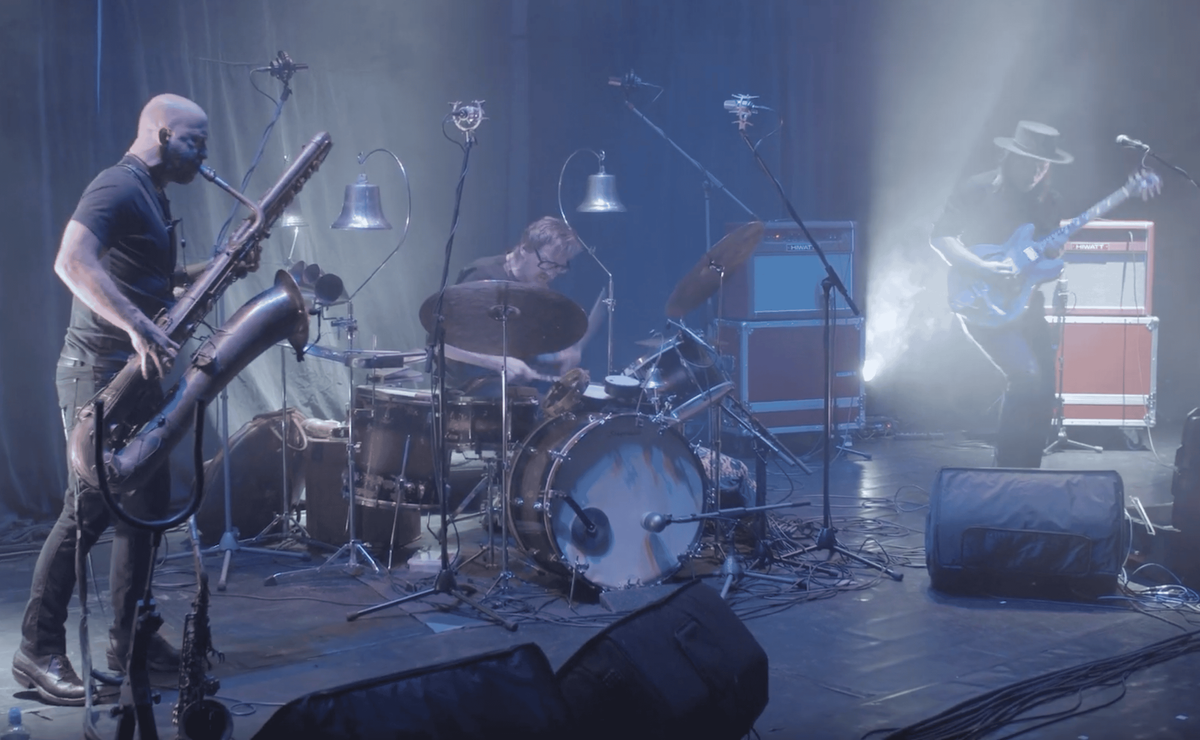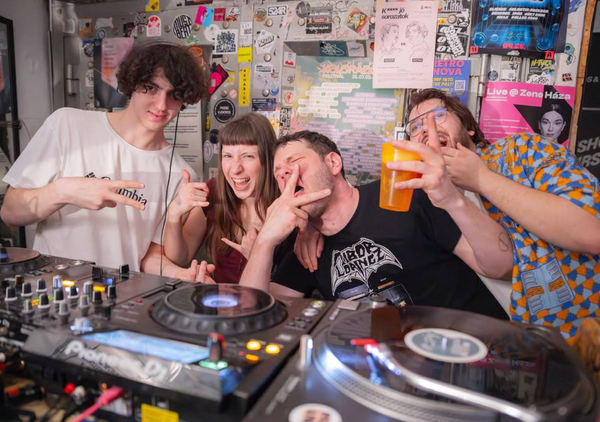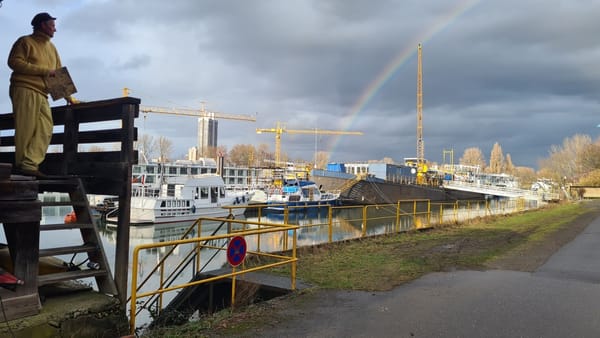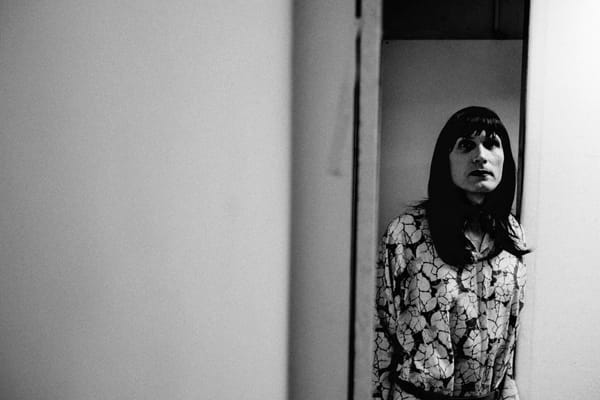Register for free to receive our newsletter, and upgrade if you want to support our work.
Two giants of avant-garde jazz and experimental music, saxophonist Colin Stetson and Norwegian guitarist and singer Stian Westerhus, have joined forces for a European tour in the winter of 2023. They played at A4 in Bratislava on 11 December. They agreed to a short interview.
What does this collaboration mean to you? Do you cooperate a lot?
Colin Stetson: Most of what we do is our own solo projects. I have a band that I play with sometimes. And then a few collaborators here and there that I do things with occasionally. But it’s very rare. Honestly, there’s not a lot of time in life to do all those things. We have to be very selective about what we end up giving time to. So I don’t just take every opportunity that’s offered or that’s possible.
You have both mastered your instruments. Can you still see some future directions playing them? Can you still find new sounds?
CS: All the time, that’s the whole point of it. We see it as a path, not really a destination, a path with goals. It’s about constantly searching and pushing and hearing something in your head, and seeing that potential in your mind’s eye.
Music demands sometimes that you have to push the limits of your instrument and find new sounds to sort of establish what you want musically. A project like this is about trying to break the instrument into bits and putting it back together because you need to find different ways of doing things. And with a setting like this, the cards are shifting again and you have to rethink things, you have to stop thinking about things because the music demands something else. And I find myself constantly trying to take myself out of the equation.
I don’t want the music to contain anything that I want. I want the music to contain what the music wants. And if I want to be like this masterful guitarist on stage, that’s putting myself above the music. I don’t really want that. I don’t really want that. I’d rather feel like I’m trying to master something that I can hear in my head, and music demands that of me. And that’s really, really pushing. And with a project like this, that goes straight into the interplay, it’s just constantly grinding away. And I think that’s what it’s all about. It’s like the essence of musical creation.
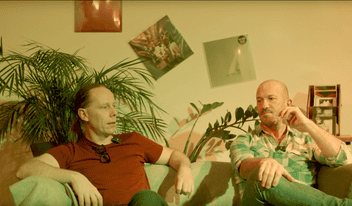
Stian, why is there so much great music coming out of Norway? You have excellent jazz, electronic music and metal and they all mix together. What’s special about Norwegian music?
Stian Westerhus: I think you could probably say that about most places, but I think Norway has had a lot of attention.
When I lived in London, London was like a big melting pot of all kinds of things. You can go and see all kinds of music all the time and that’s great. And when I came back to Norway, you could do more or less the same thing. It sounds ridiculous, but in the city of Trondheim, which has about 130,000 inhabitants, there would always be three or four concerts every day, maybe not the big acts that you would see in London.
And this melting pot is the essence of Norwegian music, whether it’s metal or jazz or whatever, and that is that everyone goes to see each other’s gigs, especially when they’re young. It’s really beautiful, all the clubs are presenting all kinds of music.
That was a really liberating thing, to see the whole scene saying, ‟What you’re doing is really interesting. I’m not really into it, but it’s interesting.” And then you get a lot of different influences in a very small and remote place.
And I also think that a lot of Norwegian music actually gets out into the world because there are not that many places to play in Norway. There are four cities I can play in Norway at the most. I don’t know. It doesn’t really answer your question, but I think there’s a lot of talk about it. But I think everywhere I go, I see so many fantastic musicians: Germany, Poland, the Czech Republic, Slovakia, wherever you go. There’s so much fantastic stuff going on, especially now, that everybody’s getting their music released.
You are both recording and performing artists: what have been the biggest challenges for you in recent years? Was it COVID, streaming services and their revenues, computerised music production?
CS: For many years, I have largely worked by myself, on my solo music. I record, mix, and produce it all myself. I do a lot of work in film, and my soundtracks I do almost exclusively myself. I record and mix. COVID, in terms of its effects on my career, has had no effects on my career.. I have close friends whose careers have been completely destroyed. But for me, the fact that I wasn’t playing, although it was something personally and emotionally devastating, wasn’t something that affected me from a career perspective.
We have to maintain our craft, continue to make the best music we can, go out and bring that music to people and put our bodies and minds through it, but at the same time constantly innovate because it’s not a static landscape that you’re interacting in.
But I think it feels almost more important now than ever, even after COVID and with the digital developments that are happening, it feels almost profound in a way to play live for people. To connect with the audience in real time, in a room. I feel so strongly that music transcends the format and the performer and that music is almost like a sacred, spiritual thing. Yeah, it’s always been church.
I think what’s really important in these difficult days and times is to play live. I think it just sums up everything that I feel really strongly about music.
Photos: Daniel Kazankov | Patricia Batki
This article is brought to you by 34.sk as part of the EM GUIDE project – an initiative dedicated to empowering independent music magazines and strengthen the underground music scene in Europe. Read more about the project at emgui.de.
Funded by the European Union. Views and opinions expressed are however those of the author(s) only and do not necessarily reflect those of the European Union or the European Education and Culture Executive Agency (EACEA). Neither the European Union nor EACEA can be held responsible for them.


